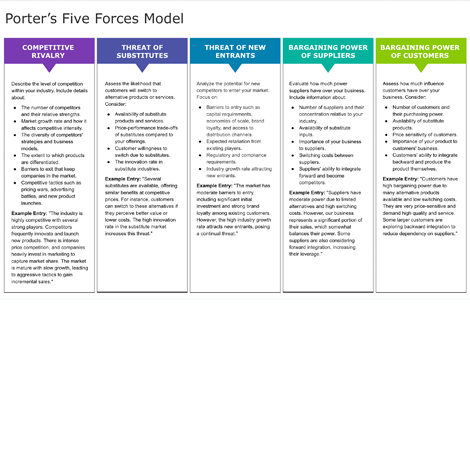- Featured
- Export Emails to Sheets
- Screenshot Tool
- Email Tracker
- MailKing - automated mass emailing
- Save Emails as PDF
- Export Emails to Google Docs
- Multi Email Forward
- Meeting Scheduler
- Email Templates
- All Apps
- Gmail Label Sharing
- Auto Bcc for Gmail
- Mobile Text Alerts for Gmail
- Save Emails to Google Drive
- Save Emails to Dropbox
- Auto Follow Up for Gmail
- Backup and Archive Emails to Amazon S3
- Free Video Email
- Gmail Web Clipper
- Send your Email to SMS
- Gmail Snippets
- Gmail Phone
- Email Zoom Text Reader
- Gmail Screencast
- HTML Editor for Gmail
- Notes for Gmail
- Rename Email Subject
- Gmail Free Online Polls & Surveys
- Schedule Emails
- Snooze Emails
- Share Emails as Links
- Gmail URL Link Preview
- Gmail Time Tracker
- Free Email Tracking Blocker
- Save and Backup My Emails
- Attach And Share Cloud Files for Gmail

Enhance your strategic analysis with our Porter's Five Forces Model Google Sheets Template by cloudHQ. This powerful tool helps business owners and analysts evaluate the competitive forces within their industry, providing a structured framework to assess competitive rivalry, the threat of substitutes, the threat of new entrants, bargaining power of suppliers, and bargaining power of customers. Perfect for startups, established businesses, and consultants, our template offers a clear and organized way to identify opportunities and threats in your market environment. Utilize the insights from Porter's Five Forces to develop robust strategies and gain a competitive edge. Download the cloudHQ Porter's Five Forces Model Google Sheets Template now and drive your business success with data-driven decisions!
1 of 1
Porter’s Five Forces Model
COMPETITIVE RIVALRY
Describe the level of competition within your industry. Include details about:
- The number of competitors and their relative strengths.
- Market growth rate and how it affects competitive intensity.
- The diversity of competitors' strategies and business models.
- The extent to which products are differentiated.
- Barriers to exit that keep companies in the market.
- Competitive tactics such as pricing wars, advertising battles, and new product launches.
Example Entry: "The industry is highly competitive with several strong players. Competitors frequently innovate and launch new products. There is intense price competition, and companies heavily invest in marketing to capture market share. The market is mature with slow growth, leading to aggressive tactics to gain incremental sales."
THREAT OF SUBSTITUTES
Assess the likelihood that customers will switch to alternative products or services. Consider:
- Availability of substitute products and services.
- Price-performance trade-offs of substitutes compared to your offerings.
- Customer willingness to switch due to substitutes.
- The innovation rate in substitute industries.
Example Entry: "Several substitutes are available, offering similar benefits at competitive prices. For instance, customers can switch to these alternatives if they perceive better value or lower costs. The high innovation rate in the substitute market increases this threat."
THREAT OF NEW ENTRANTS
BARGAINING POWER �OF SUPPLIERS
CHANNELS
BARGAINING POWER�OF CUSTOMERS
Evaluate how much power suppliers have over your business. Include information about:
- Number of suppliers and their concentration relative to your industry.
- Availability of substitute inputs.
- Importance of your business to suppliers.
- Switching costs between suppliers.
- Suppliers' ability to integrate forward and become competitors.
Example Entry: "Suppliers have moderate power due to limited alternatives and high switching costs. However, our business represents a significant portion of their sales, which somewhat balances their power. Some suppliers are also considering forward integration, increasing their leverage."
Analyze the potential for new competitors to enter your market. Focus on:
- Barriers to entry such as capital requirements, economies of scale, brand loyalty, and access to distribution channels.
- Expected retaliation from existing players.
- Regulatory and compliance requirements.
- Industry growth rate attracting new entrants.
Example Entry: "The market has moderate barriers to entry, including significant initial investment and strong brand loyalty among existing customers. However, the high industry growth rate attracts new entrants, posing a continual threat."
Assess how much influence customers have over your business. Consider:
- Number of customers and their purchasing power.
- Availability of substitute products.
- Price sensitivity of customers.
- Importance of your product to customers' business.
- Customers' ability to integrate backward and produce the product themselves.
Example Entry: "Customers have high bargaining power due to many alternative products available and low switching costs. They are very price-sensitive and demand high quality and service. Some larger customers are exploring backward integration to reduce dependency on suppliers."